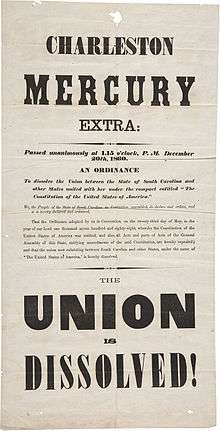Charleston Mercury
The Charleston Mercury was a secessionist newspaper in Charleston, South Carolina, founded by Henry L. Pinckney in 1819. He was its sole editor for fifteen years. It ceased publication with the Union Army occupation of Charleston. After the American Civil War, publication resumed in November 1866 before the paper closed permanently two years later in 1868.[1]

History
During the American Civil War, the paper was "strongly secessionist", calling upon South Carolinian men to take up arms to defend the South.[2] Its owner, Robert Barnwell Rhett, had two plantations and 190 slaves.[3] The paper was critical of Davis and Confederate generals, in contrast with its pro-Davis competitor the Charleston Courier.[1]
Humorist George William Bagby was a Richmond, Virginia correspondent of the Charleston Mercury during the Civil War era and "covered the politics of the war and made a reputation for Hermes, his pen name, as a fearless writer who would criticize Confederate General Robert E. Lee as easily as Confederate President Jefferson Davis".
Modern paper
An online newspaper with the same name was created in March 2000 by Charles W. Waring III and a group of investors. It covered the inauguration of George W. Bush in January 2001, and covered the Taste of the South in May of the same year. In October 2002, the Evening Post Publishing Company purchased 70 percent of the paper and a print edition was started. From that point until March 2013, the paper published every two weeks; since then, the paper has published a monthly edition under the ownership of Holy City Productions, LLC, an independent media firm owned by Waring and a group of investors. The "Charleston Mercury" newspaper reaches roughly 50,000 readers in the greater Charleston area. (Sources: www.charlestonmercury.com)
Tim Hames, former writer for The Times of London, wrote for the Charleston Mercury and The Tablet.
References
- Heidler, David Stephen, and Jeanne T. Heidler (eds.) (2002). Encyclopedia of the American Civil War: A Political, Social, and Military History. New York: W. W. Norton & Company. pages 407–408. ISBN 9780393047585.
- "Charleston Mercury". November 3, 1860.
- Henshaw, Tom (December 18, 1960). "The Secession of South Carolina". The News and Courier (Charleston, South Carolina). p. 18.